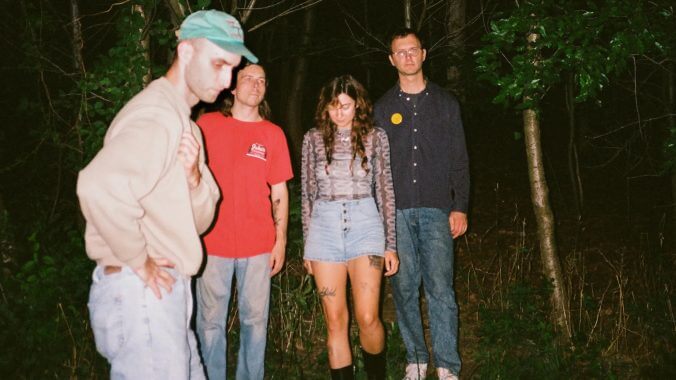Hotline TNT Level Up
Will Anderson talks the origins of the band, their label debut and maintaining the DIY ethos of their self recordings.
Photo by Wes Knoll
Hotline TNT, the longtime project of Will Anderson, is “leveling up.” My heart sinks a little bit as he tells me this with a big smile on his face from somewhere in St. Louis. He’s in his van and can see the Gateway Arch looming in the background as he explains that the band is signed to Third Man Records now and has a whole team working with them on their new record, Cartwheel. For the first time, he sees the possibility of turning this into a real career—no more substitute teaching or bartending. This record is going to be his shot at really making it with this music thing.
I feel like the rug is getting torn out from under me, like he’s going to stop and say “Just kidding!” Coming from a guy who still prints his own basketball fanzine and initially only uploaded his first album, Nineteen in Love, to Youtube it feels like the exact kind of comment he would cringe at. However, he doesn’t, and though it seems like, in that second, I’m experiencing every fan’s biggest fear-their favorite band admitting that it might be time for them to suck it up and sell out, that’s so far from what’s happening with Hotline TNT.
True, Cartwheel is “the big swing” for Anderson, but that’s not because of press prominence or his departure from strictly self-recording or anything superficial. It’s because of the arresting honesty he employs from the buzzy opener “Protocol” to the closing shimmer of “Stump,” where he avows “Cover up holes in the yard / But you stole my heart.” These point-blank confessions and sketches of scenes are just vague enough to make Cartwheel feel deeply personal without forcing Anderson to put all his cards on the table. It’s not the first step towards selling his soul in exchange for mainstream success, it’s actually one of the most raw records I’ve heard in a while.
A lot of this sincerity is no doubt due to the relationships-some familial, some romantic, some between friends and people he would make music with-that lay at the heart of the album. Anderson manages to make soundscapes feel as profound as the life-altering impact these connections have on us, like the feedback and desperate distortion that decorates “Maxine.” Even amidst the copious amount of Coors Light and “craziest party of all time” in the music video for “I Thought You’d Change,” the failing relationship is what takes center stage. Trying to make sense of the crossed wires and miscommunications is what prompted Anderson to start writing his own songs in college.“I started getting into relationships and started feeling like I needed some sort of outlet to write about myself or someone,” he says.
Anderson grew up playing in his school’s jazz ensemble and in various cover bands with his brother. His first introduction to live music was attending Christian music festivals, “I did have a phase where I was a born again Christian in middle school, but that was more just an opportunity to hang out with girls on Wednesday night after school,” he says. Anderson’s family was instrumental in shaping his music taste, with his older brother introducing him to nu metal bands like Limp Bizkit and his mom buying him his very first Strokes CD.
-

-

-

-

-

-

-

-

-

-

-

-

-

-

-

-

-

-

-

-

-

-

-

-

-

-

-

-

-

-

-

-

-

-

-

-

-

-

-

-








































